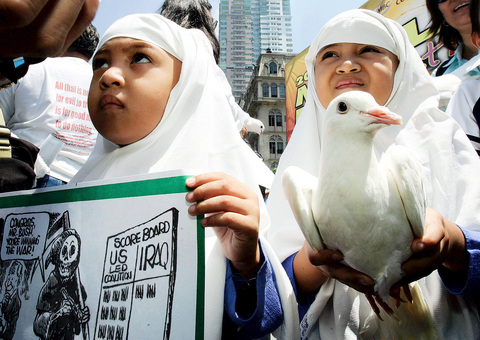Iraq's religious leaders called for calm yesterday amid fears of revenge attacks one day after a suicide bomber killed 47 Iraqis and wounded more than 80 in a packed Shiite funeral tent in Mosul.
Grieving families cancelled a planned public funeral procession for the victims in the northern city after a mortar shell early yesterday slammed into the site of the carnage 24 hours earlier.
Sunni Muslim leaders, fearful of reprisals, urged calm in the city.

PHOTO: EPA
"It was a terrorist attack meant to spark civil war but I think the Sunnis and Shiites will not succumb," said Nureddine Hayali, a spokesman for the Islamic Party.
Iraq's Shiite clerics urged cool heads after the latest calamity.
The office of Grand Ayatollah Ali al-Sistani, the spiritual guide for Iraq's Shiites, said the revered cleric was calling for "unity and solidarity among all Iraqis despite the attacks targeting the innocent."
Sistani has consistently denounced vigilante justice against Iraq's Sunnis, perceived as fuelling the insurgency, whom the 15-million strong Shiite majority blames for many attacks carried out against it.
Mosque struck
The bomber struck on Thursday as mourners gathered next to the Sadreen mosque, where a service was being held for Hisham al-Araji, the Mosul representative for radical Shiite leader Moqtada Sadr.
Shiite cleric Sayed Jassem Mohamed recalled the moment when the explosion shredded a jammed funeral tent at 5:20pm.
"A ball of fire shot out, followed by falling debris, and panic swept the outdoor tent next to the Sadreen mosque," Jassem said.
"Volunteers started to put out the flames while others evacuated the dead and the wounded from the middle of the tent, which was destroyed by the blast."
Doctors put the dead at 47 and the wounded at 81.
In Mosul, residents expressed their anger.
"Who pretends this is holy war? The authors of this cowardly attack are looking to destroy Iraq and push it into the abyss," said Jalal Qassem, a doctor.
Sunni Muslim Arabs make up about half of Mosul's 1.5 million population, while the rest are divided among Kurds, Turkmen, Shiites, Christians and other groups.
The city is a stronghold of Islamic militant fighters and former regime loyalists. It has been gripped by violence since November when rebels launched an offensive and police abandoned their posts.
Coalition planned
The latest blow for Iraq's majority Shiites came as their political alliance, which swept the elections, was putting the final touches on a deal with the Kurds to form a coalition ahead of the new parliament's first session on Wednesday.
The two sides have drafted a three-page principle of understanding that will formalize their alliance, the Shiite side said.
"Both sides agree. Most likely it will be signed Sunday [tomorrow]," said Adnan Ali, an aide to the frontrunner for prime minister, Ibrahim Jaafari, a Shiite.
The document reaffirms Iraq's commitment to the transitional law (TAL), passed under the US occupation.
"We all agree that the TAL is the constitution for this government," Adnan said, adding it would govern the sensitive issue of the northern oil city of Kirkuk, which Kurds claim as their own.
He said the sides were in accord that Jaafari would be prime minister and Kurdish leader Jalal Talabani would be president.

Chinese President Xi Jinping (習近平) is to visit Russia next month for a summit of the BRICS bloc of developing economies, Chinese Minister of Foreign Affairs Wang Yi (王毅) said on Thursday, a move that comes as Moscow and Beijing seek to counter the West’s global influence. Xi’s visit to Russia would be his second since the Kremlin sent troops into Ukraine in February 2022. China claims to take a neutral position in the conflict, but it has backed the Kremlin’s contentions that Russia’s action was provoked by the West, and it continues to supply key components needed by Moscow for

Japan scrambled fighter jets after Russian aircraft flew around the archipelago for the first time in five years, Tokyo said yesterday. From Thursday morning to afternoon, the Russian Tu-142 aircraft flew from the sea between Japan and South Korea toward the southern Okinawa region, the Japanese Ministry of Defense said in a statement. They then traveled north over the Pacific Ocean and finished their journey off the northern island of Hokkaido, it added. The planes did not enter Japanese airspace, but flew over an area subject to a territorial dispute between Japan and Russia, a ministry official said. “In response, we mobilized Air Self-Defense

CRITICISM: ‘One has to choose the lesser of two evils,’ Pope Francis said, as he criticized Trump’s anti-immigrant policies and Harris’ pro-choice position Pope Francis on Friday accused both former US president Donald Trump and US Vice President Kamala Harris of being “against life” as he returned to Rome from a 12-day tour of the Asia-Pacific region. The 87-year-old pontiff’s comments on the US presidential hopefuls came as he defied health concerns to connect with believers from the jungle of Papua New Guinea to the skyscrapers of Singapore. It was Francis’ longest trip in duration and distance since becoming head of the world’s nearly 1.4 billion Roman Catholics more than 11 years ago. Despite the marathon visit, he held a long and spirited

China would train thousands of foreign law enforcement officers to see the world order “develop in a more fair, reasonable and efficient direction,” its minister for public security has said. “We will [also] send police consultants to countries in need to conduct training to help them quickly and effectively improve their law enforcement capabilities,” Chinese Minister of Public Security Wang Xiaohong (王小洪) told an annual global security forum. Wang made the announcement in the eastern city of Lianyungang on Monday in front of law enforcement representatives from 122 countries, regions and international organizations such as Interpol. The forum is part of ongoing